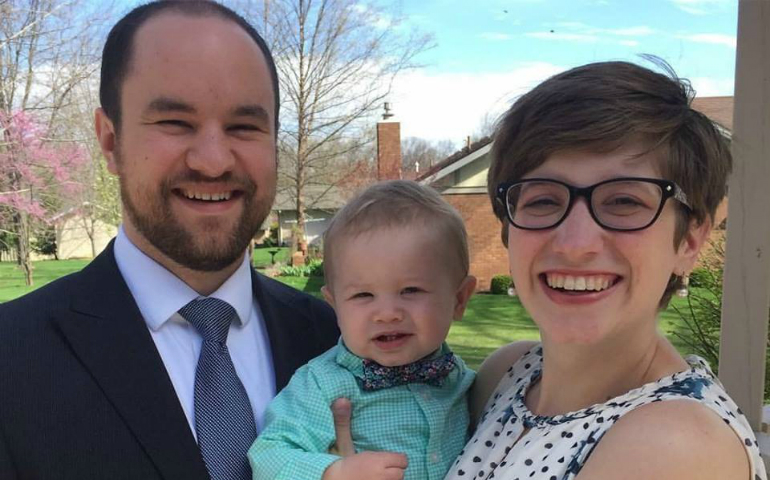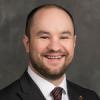
Christian Mocek with his son Simon and wife Gillian. (Provided photo)
"Hey, do you want to grab some lunch?" my friend asked as she entered the room. I looked over to my wife, Gillian, who gave me a reassuring glance as she lay half asleep on the hospital bed. I didn't want to leave, but they both knew I needed to.
"So are you nervous?" my friend asked, as we placed our trays on the crumb-filled table in the hospital dining room. I sat down, started picking though a salad I didn't want to eat and said, "What do you think?"
The truth is I had been nervous for nine months. The day Gillian told me she was pregnant was just the start of many anxiety-riddled days to come. There was a lot to be done before our baby came — finances to work out, IKEA furniture to be assembled, and there was this one unknown that superseded all the rest of my worries tenfold.
Gillian has cystic fibrosis, a genetic disease with no cure that mostly affects the lungs, pancreas, liver and intestines. Her body produces abnormal mucus that is excessively sticky and thick, which leads to blockages within the lungs and airways. This leads to repeated and serious lung infections that often damage the lungs.
Thirty years ago, women with cystic fibrosis didn't have babies because they didn't live long enough to have them. The average life expectancy has doubled in Gillian's lifetime to 30s, 40s and beyond. But it is still relatively rare for a woman with cystic fibrosis to have a baby, although thankfully, it is becoming less rare every day.
To treat this disease, she does three 30-minute breathing treatments a day — a combination of an inhaled medicine and a vest that fills up with air and shakes to work the mucus out of her lungs. She also takes over 20 pills a day — a combination of vitamins, antibiotics and digestive enzymes.
Needless to say, her pregnancy presented a number of challenges. After we consulted with countless teams of doctors, a plan was developed to care for mom and baby. For most of her pregnancy, Gillian visited a high-risk OB-GYN clinic every two weeks. They kept a close watch on her blood sugar and did numerous ultrasounds to check our baby's heart rate, growth rate and brain development.
Gillian changed a few of her medicines and even received a new treatment vest that would fit comfortably around her growing belly. Cystic fibrosis patients generally struggle to maintain weight due to their compromised digestive system, so Gillian also devoured peanut butter and weight-gain supplements to ensure she had the proper nutrients for our baby.
By the time Gillian and I settled into the hospital so she could be induced, she had endured nine months of overwhelming amounts of testing and conversation about our baby. Neither of us doubted the worth of all that testing, though, and miraculously her pregnancy was without complication.
A year ago this month, Gillian gave birth to our baby boy Simon. In the days and months that followed, we found out what it looks like to raise a child while also tending to her medical needs. Now, Simon tags along with Gillian to her doctor's appointments and loves to climb on her treatment machines. It is common to see vibrating vests, tubes and medicine bottles seamlessly mixed together with curious baby hands in our home.

In so many respects, our life is just like the life of any new parents. With tired eyes and a full cup of coffee, we set out each day to tackle our respective responsibilities — Gillian with work in the home and I with work outside the home. Our hearts skip a beat each time we hear our baby cackle during a game of peek-a-boo, and we understand why so many people with kids show up late to church.
We also face the reality that Simon doesn't know his mom has a terminal illness. He doesn't know that there are hundreds of people working tirelessly to develop effective treatments so that his mom lives to see him graduate college, get married and have children of his own. He doesn't know his mom and I worry about that much too often.
What he does know — that his parents love him more than anything in the world — is all he needs to know for now.
Maya Angelou once said, "Hope and fear cannot occupy the same space at the same time, so invite one to stay." With all of the uncertainty that surrounds cystic fibrosis about both the present and the future, Angelou's words are something I hold dear to my heart. It is easy to see uncertainties in the worst light and dwell in the darkness of despair.
But as Pope Francis recently said in his TED talk, "Hope is the virtue of a heart that doesn't lock itself into darkness, that doesn't dwell on the past, does not simply get by in the present, but is able to see a tomorrow. Hope is the door that opens onto the future."
After I finished picking though my salad, dodging demands from my friend to eat, we both decided to head back up to Gillian's room. Before we headed up, she looked at me and said: "Whatever happens, now or in the future, I'll be there for him and for you."
Hours later, the nurse placed a beautiful baby boy in my arms. Through clouded eyes, I looked at him, then I looked at Gillian. I thought of those words my friend told me many hours before and I promised that whatever happened, now or in the future, that I would be there for her and for him.
I trust with all the hope I can muster that God will do the same for all of us.
I know by faith that he already is.
[Christian Mocek is the director of alumni relations at St. Meinrad, a Benedictine monastery, seminary and school of theology in southern Indiana. He lives in New Albany, Indiana, with his wife, Gillian, and their little boy, Simon. You can find his reflections on parenthood, marriage and young adulthood at mocekmusings.com.]
Editor's note: We can send you an email alert every time a Young Voices column is posted to NCRonline.org. Go to this page and follow directions: Email alert sign-up.


